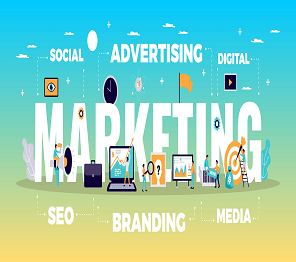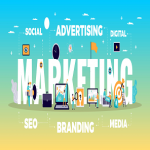In today's digital age, effective marketing is no longer just a matter of running ads and hoping for the best. It's a dynamic and ever-evolving art form that requires careful planning, creativity, and adaptability. Welcome to the world of digital marketing, where success lies in mastering a variety of strategies to connect with your audience, drive conversions, and achieve your business goals. In this blog post, we'll explore the art of digital marketing and the strategies that can lead your business to success in the online world.
1. Know Your Audience Inside Out
The foundation of any successful digital marketing strategy is a deep understanding of your target audience. Who are they? What are their preferences, needs, and pain points? What platforms do they use? What are their online behaviors? Conduct thorough market research and create detailed buyer personas to tailor your marketing efforts effectively.
2. Content is King
Quality content lies at the heart of digital marketing. Whether it's blog posts, videos, infographics, or social media updates, your content should provide value to your audience. It should inform, entertain, or solve problems. Invest in content that educates, inspires, and engages your target audience.
3. Search Engine Optimization (SEO)
SEO is the art of making your content discoverable by search engines like Google. Optimizing your website and content for relevant keywords, improving site speed, and building high-quality backlinks are all part of an effective SEO strategy. Appearing on the first page of search results can significantly boost your online visibility and traffic.
4. Leverage Social Media
Social media platforms are powerful tools for building your brand and engaging with your audience. Choose the platforms that align with your target audience and industry. Create compelling, shareable content and engage with your followers regularly. Paid social media advertising can also help you reach a wider audience.
5. Email Marketing
Email marketing remains a highly effective way to nurture leads and retain customers. Create personalized email campaigns that provide value, such as product recommendations, educational content, and exclusive offers. Segment your email list for more targeted messaging.
6. Pay-Per-Click (PPC) Advertising
PPC advertising, such as Google Ads and social media advertising, allows you to reach potential customers directly. Use strategic keyword targeting, compelling ad copy, and A/B testing to maximize your ROI. Monitor and adjust campaigns regularly for optimal results.
7. Influencer Marketing
Collaborating with influencers can help you tap into their established audience and build credibility. Choose influencers whose values align with your brand, and let them authentically promote your products or services. Ensure transparency in sponsored content.
8. Data Analytics and Optimization
Digital marketing is a data-driven field. Utilize analytics tools to track the performance of your campaigns. Measure key performance indicators (KPIs) such as website traffic, conversion rates, and customer acquisition cost. Use the insights to make data-backed decisions and continually optimize your strategies.
9. Marketing Automation
Streamline your marketing efforts with automation tools. Automate email sequences, social media posting, lead nurturing, and more. Marketing automation not only saves time but also ensures consistent and timely communication with your audience.
10. Adapt and Evolve
The digital marketing landscape is constantly evolving. Stay updated on industry trends, algorithm changes, and emerging technologies. Be willing to adapt and experiment with new strategies to keep your marketing efforts fresh and effective.
Conclusion
Digital marketing is both an art and a science. It requires creativity, strategy, and a commitment to ongoing improvement. By knowing your audience, creating valuable content, and leveraging the right mix of strategies, you can master the art of digital marketing and achieve success in the competitive online landscape. Remember that digital marketing is not static, so be ready to evolve and refine your strategies to stay ahead in the ever-changing digital world.








